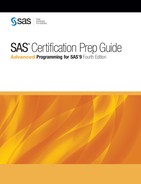Displaying Macro Variable Values in the SAS Log
The SYMBOLGEN Option
When
you submit a macro variable reference, the macro processor resolves
the reference and passes the value directly back to the input stack.
Therefore, you do not see the value that the compiler receives. In
order to debug your programs, it might be useful for you to see the
value that replaces your macro variable reference. You can use the
SYMBOLGEN system option to monitor the value that is substituted
for a macro variable reference.
|
General form, OPTIONS
statement with SYMBOLGEN option:
OPTIONS NOSYMBOLGEN | SYMBOLGEN;
NOSYMBOLGEN
specifies that log
messages about macro variable references are not displayed. This is
the default.
SYMBOLGEN
specifies that log
messages about macro variable references are displayed.
|
This system option displays
the results of resolving macro variable references in the SAS log.
That is, when the SYMBOLGEN option is turned on, SAS writes a message
to the log for each macro variable that is referenced in your program.
The message states the macro variable name and the resolved value.
Note: Remember that since SYMBOLGEN
is a system option, its setting remains in effect until you modify
it or until you end your SAS session.
Example
Suppose you have previously
assigned values to the macro variables
amount, city,
and company, and you submit the following
code: data new; set sasuser.all; where fee>&amount; where also city_state contains "&city"; where also student_company contains '&company'; run;
Here is a sample SAS
log that shows the messages that are generated by the SYMBOLGEN option
for this code. The WHERE ALSO conditions augment the initial WHERE
condition using the AND operator. In this example, the where processing
is done for the following condition: (fee>&amount) AND (city_state
contains "&city") AND (student_company contains '&company').
110 where fee>&amount; SYMBOLGEN: Macro variable AMOUNT resolves to 975 111 where city_state contains "&city"; SYMBOLGEN: Macro variable CITY resolves to Dallas 112 where student_company contains '&company'; |
Notice that no message
is displayed for the final macro variable reference
(
'&company'). Because
this macro variable reference is enclosed in single quotation marks
rather than in double quotation marks, the word scanner does not call
the macro facility to resolve it.
The %PUT Statement
Another
way of verifying the values of macro variables is to write your own
messages to the SAS log. The %PUT statement writes text to the SAS
log.
|
General form, basic
%PUT statement:
%PUT text;
text
is any text string.
|
The %PUT statement
-
writes only to the SAS log
-
always writes to a new log line, starting in column one
-
writes a blank line if text is not specified
-
does not require quotation marks around text
-
resolves macro triggers in text before text is written
-
removes leading and trailing blanks from text unless a macro quoting function is used
-
wraps lines when the length of text is greater than the current line size setting
-
can be used either inside or outside a macro definition.
Example
Suppose you want to
verify the value of the macro variable
city.
Since the %PUT statement resolves macro references in text before
writing text to the SAS log, you can use it to show the stored value
of city. %put The value of the macro variable CITY is: &city;
120 %put The value of the macro variable CITY is: &city; The value of the macro variable CITY is: Dallas |
You can also simply
submit the statement
&put &city; without
any additional text. This statement writes the resolved value of the
macro variable city to the SAS log.
However, it does not write any additional text to the log. You might
find that it is a good idea to add explanatory text to your %PUT statements
in order to maintain clarity in the SAS log. The %PUT statement has
several optional arguments that you can add.
|
Argument
|
Result in SAS Log
|
|---|---|
|
_ALL_
|
Lists the values of
all macro variables
|
|
_AUTOMATIC_
|
Lists the values of
all automatic macro variables
|
|
_LOCAL_
|
Lists user-generated
local macro variables
|
|
_USER_
|
Lists the values of
all user-defined macro variables
|
121 %let year=2002; 122 %let city=New York; 123 %let region=South; 124 %put _all_; GLOBAL YEAR 2002 GLOBAL REGION South GLOBAL CITY New York AUTOMATIC AFDSID 0 AUTOMATIC AFDSNAME AUTOMATIC AFLIB AUTOMATIC AFSTR1 AUTOMATIC AFSTR2 AUTOMATIC FSPBDV AUTOMATIC SYSBUFFR AUTOMATIC SYSCC 0 AUTOMATIC SYSCHARWIDTH 1 AUTOMATIC SYSCMD AUTOMATIC SYSDATE 29MAY02 |
Notice that when you
use optional arguments such as _ALL_, each macro variable name is
also written to the SAS log, along with a label of either AUTOMATIC
or GLOBAL.
..................Content has been hidden....................
You can't read the all page of ebook, please click here login for view all page.
